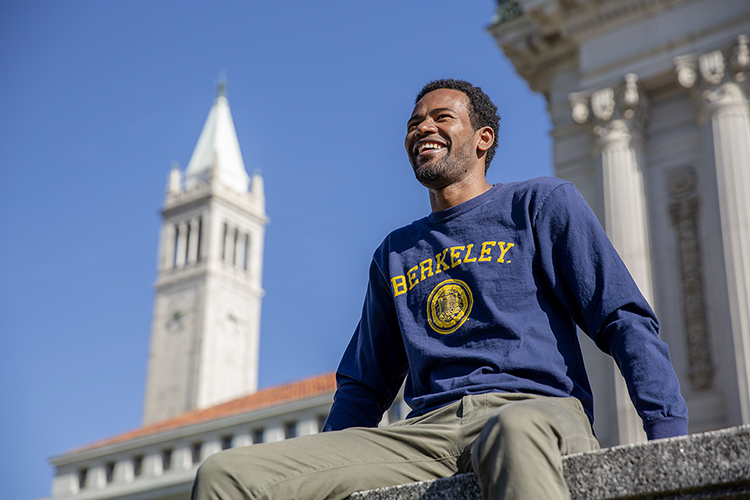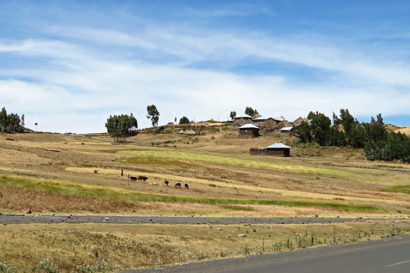From farming in rural Ethiopia to graduating from UC Berkeley
Lelisa Bera, who graduates this week with a bachelor's degree in psychology, walked three hours to and from school without shoes as a child in Ethiopia in the hope that the sacrifice would one day pay off

May 21, 2019
Growing up in rural Ethiopia, Lelisa Bera knew that getting an education wasn’t a given. It was a privilege that many parents couldn’t afford to give their children.

Farmland in Sheno, a town in the Oromia Region about 350 miles northwest of Dawo Saden, where Bera grew up. (Photo by Brian Henderson via Flickr)
He was born in a village in the Oromia Region called Dawo Saden, where his mom and dad worked as farmers. They spent long hours in the fields harvesting vegetables and grains, and tending to cattle and goats. By age 5, Lelisa began to help his parents with the labor.
“There was not much to inspire you to go to school,” he says. “I would see one student going to school from one area, another from a different area. But for most kids, their families needed them to stay home and help at the farm. There’s a very high illiteracy rate.”
When Lelisa turned 7, his mom decided that he would go to school. It was a long walk — three hours, round trip — and Lelisa didn’t own a pair of shoes. But his mom hoped education would be a worthwhile investment, so she pushed her son to make the daily trek.
On Wednesday, May 22, Bera, now 32, will receive his bachelor’s degree in psychology from UC Berkeley. It’s an accomplishment that he sees not as an ending, but as a launching-off point for sharing what he’s learned at Berkeley with the world.
And without a teacher who gently encouraged him to think bigger, he might never have made it to where he is today.
Learning and teaching in Ethiopia
In elementary school, Lelisa felt uneasy. Teachers were harsh and punitive — if he didn’t bring in completed homework because he was working in the fields until dark the day before, they would slap him and hit his palms with sticks.
In class, Lelisa and his classmates would learn about local landmarks, like nearby mountains and lakes, but they didn’t really learn about what lay beyond their community.
“I didn’t feel like I was learning and developing as a student and person, moving forward,” he says. “The teachers weren’t curious about who we were. They didn’t inspire us to think creatively.”

Bera’s father, Debo, and his mother, Demitu. (Photo courtesy of Lelisa Bera)
But in grade 7, Lelisa’s world began to open up. In addition to buying his first pair of shoes with money he saved up from selling hens, he had a geography teacher, Gizaw Gebissa, who showed him that there was another, kinder way of being a teacher.
“The way he taught — he tried to make us understand,” says Bera. “He’d give simple examples. If you forgot something or answered a question wrong, he’d touch your head and tell you, ‘You have to work hard. You have to do your reading.’ He was a mentor — someone who cared.”
Lelisa began to dream, to think about more than just what he was learning in school. He began to imagine leaving his village, maybe becoming a scientist.
After high school, he went to Jimma Teachers College to get a diploma in teaching and began teaching Afaan Oromoo — the indigenous language that he’d grown up speaking — to a first-grade class at Dima Magno Elementary School in Sebeta. Lelisa channeled his former geography teacher, encouraging the 6- and 7-year-olds to talk about their lives, to share their thoughts and ask questions. He even created a club, where they could dance and sing in Afaan Oromoo.

Bera has six younger siblings — four sisters and two brothers. From left: his brother, Ibsa; sisters, Worki and Bilise; his mother, Demitu, and father, Debo; sisters, Darare and Kumale; and brother, Felmeta. (Photo courtesy of Lelisa Bera)
“They make your day beautiful,” says Bera. “They are the best resource if you want to improve yourself as a human. They are honest. They come with ambition, passion, dreams. You can make them to be bad. Or you can make them to be good. Some of them really listen, they take it to heart, and they want to grow. I was really, really happy. They inspired me.”
After two years of teaching, Bera felt he had to further his education to support his family. As the oldest of four sisters and two brothers, he didn’t want to see them go through what he did. So, he applied to the federal Diversity Visa program and won.
In 2013, Bera moved to Los Angeles, where he worked night shifts as a housekeeper in a hotel and attended Los Angeles Southwest College. His counselor at the community college encouraged him to apply to Berkeley, so he did and was accepted. And in fall 2016, he transferred to UC Berkeley.
“My parents were really proud,” he says.
But being at Berkeley was harder than he thought it would be. He missed his family and friends and had to work part-time in the Crossroads Cal Dining hall on top of managing a rigorous academic workload. He felt isolated, unable to find joy in learning.
It wasn’t until he met professors who went out of their way to mentor him that he began to realize how much he could learn and grow at Berkeley.

Bera met Alexander Akhromtsev, who graduated from Berkeley with a bachelor’s degree in psychology last year, on orientation day in 2016. “When you find a good person who you can spend quality time with like Lelisa, it can definitely change your day-to-day life,” says Akhromtsev. “He’s very kind-hearted. He will sacrifice his time for you. It’s tough to find that nowadays.” (UC Berkeley photo by Brittany Hosea-Small)
Struggling, then thriving at Berkeley
“When I first saw Lelisa, I was like, ‘Whoa, who is this guy?’” says Carolyn Chen, an ethnic studies professor at UC Berkeley. “He was sitting in the back of the class with a hoodie on, kind of slumped down in the chair. He wasn’t talking at all, not looking at anyone. I thought, ‘This is going to be a hard student to teach.’”

In spring 2017, Lelisa took professor Carolyn Chen’s class, Religion, Race and Ethnicity. “He really transformed the class,” says Chen. “He showed how much he was willing to learn and give.” (UC Berkeley photo by Brittany Hosea-Small)
It was spring 2017, and Bera was taking a class from professor Chen called Religion, Race and Ethnicity. His first semester had been challenging, and he was struggling to balance all of his responsibilities. “I was just there to take the class, then go home,” he says. “I didn’t want to talk to anyone. I don’t know why.”
But after a few classes, Chen saw Bera start to open up. He began to answer some questions, and when he saw that she welcomed it, he participated more.
“I thought, ‘This is someone who believes in me,’” he says.
Chen says Bera transformed the class with his warmth, compassion, camaraderie and passion for learning.
“It’s never the teacher who makes the class. You’re sort of like a conductor of an orchestra. You have all these different instruments, and you’re trying to figure out how to get them to create music. Then, you have this person playing this beautiful solo and everyone is like, ‘Hey, let me join in and make beautiful music together.’ That’s what Lelisa was for this course.”
Bera began to get more involved on campus. He volunteered to be a Golden Bear Orientation leader and worked in the psychology department as a peer adviser. And he dedicated himself to supporting fellow transfer students, working as a teaching assistant and peer advocate at the Transfer Student Center, a teaching assistant for an education class to help transfer students transition to Berkeley and a resident adviser for the transfer student community in the Maximino Martinez Commons residence hall.

Bera took a class in the psychology department called Love and Close Relationships, taught by lecturer Melissa Bayne. “Lelisa had a way of modeling vulnerability to other students by asking questions that clearly had personal relevance as opposed to staying distant and theoretical,” says Bayne. “It allowed us all to see his humanity and who he is.” (UC Berkeley photo by Brittany Hosea-Small)
And he dove into his psychology research. On top of working in three labs in the psychology department, Bera became a McNair Scholar, using his award to conduct research on how experiencing prejudice and harboring anger affects sleep.
This summer, Bera plans to travel to Ethiopia to visit his family. All of his siblings are now in school in Ethiopia — his youngest sister is in fifth grade and wants to be a doctor, and his younger brother is in law school. Then, he plans to apply to a Ph.D. program in psychology and work in the U.S., where he wants to teach at a university and continue to do research.
“I’m going to start in the Bay Area first,” he says. “Home is here for me now. I studied in America, so I have to give back to this nation. I can see myself helping students as a professor. I can see myself being available to students. Being there for them. Guiding them.”
He says he could see himself going back to Ethiopia someday and opening a community center, where students could go for support — for help with school or just a place to play. There are many children and students who need support in Ethiopia, he says, and he wants to be there to inspire them.
“If I know something,” says Bera, “I’m out there saying, ‘Hey, I know this. This is a resource you can use.’ If someone uses it to be better, I’m going to learn from them, too. It’s a cycle. I don’t know when I’m going to leave this world, so why keep it inside?”

Bera with Alex Akhromtsev (left) and graduating senior Chintan Bulsara. After he graduates, Bera says he plans to stay in the Bay Area. “Home is here for me now,” he says. “I studied in America, so I have to give back to this nation. I can see myself helping students as a professor. I can see myself being available to students. Being there for them. Guiding them.” (UC Berkeley photo by Brittany Hosea-Small)